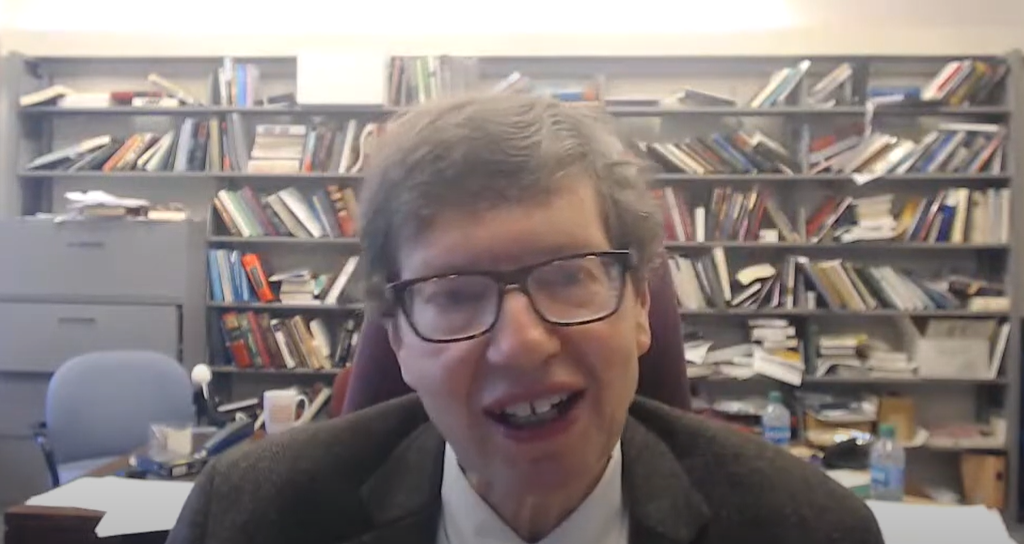Professor McGinnis testifies on freedom of speech during campaigns in special committee

A Special Committee on Governmental Ethics Reform, Campaign Finance Law was held on Thursday, October 5 at the Capitol. Many people provided testimony early on, however, it was the testimony of Professor John McGinnis, an American legal scholar and professor at Northwestern University Pritzker School of Law, that garnered many questions of interest from the special committee.
Professor McGinnis laid out four things he wanted to go over in his testimony, including:
The first principles that should guide all legislation in this area;
the essential case law the Supreme Court has handed down;
rules of thumb that he thinks any legislature should consider; and
two policy recommendations of his own that he believes are well-established across the political spectrum.
“The First Amendment protects speech, and it protects at its core political speech,” McGinnis said. “It does so partly because of distrust of rulers including legislatures. The fear that rulers will suppress speech for their own interests.”
McGinnis also pointed out that the First Amendment is a right and not about equality, combatting ideas brought up regarding campaign finance reform that suggests that speech can be suppressed or regulated during election time due to an invested interest in giving everyone an equal opportunity to speak.
“I think that is fundamentally wrong because the First Amendment is not an equality right,” McGinnis said. “It’s a right of individuals, and once you give individuals a right, they’re going to exercise it unequally because people are differently situated. Some people are connected to the media. They obviously have more influence in election. Other people are more interested in policy and joined together. Other people are not very interested. So, it’s just not possible as well as not consistent with the rights structure of the First Amendment to equalize speech at election time, and the Supreme Court has rejected that.”
He also pushed back on the idea that “money is not speech,” calling it a “simplistic truism” and using a hypothetical to provide an understanding of how money can be regulated to regulate support during a campaign.
McGinnis went onto site cases regarding First Amendment law and campaign finance, including Buckley v. Valeo, regarding campaign contributions, New York Times v. Sullivan, a case that protects the press from libel actions, Randall v. Sorrell, which noted that campaign contribution limits were too low and an infringement on Free Speech, and Americans For Prosperity v Bonta, regarding disclosure.
McGinnis then went over four rules regarding campaign finance that he believes to be of great importance. These rules include:
It is wrong to limit any independent expenditure,
Restraints on campaign contributions have to be reasonable, and should take account the fact that times change, including inflation,
All campaign finance law has to be clear,
Political contribution limits to political parties need to be higher.
McGinnis expanded on his last point after being questioned about extremism from Rep. Emil Bergquist (R-Sedgwick County).
“Putting very strong limits on political parties have the affect of giving greater voice to people who are not close to the medium voter,” McGinnis stated. “That is a consequence of the legislative decision to put restrictions on political parties…. It’s not an attempt in anyway to restrict anyone’s First Amendment rights. It’s an attempt to point out that the legislator’s view of restricting political parties has a political consequence that may not be healthy for the Democratic policy by actually making it harder for political parties to get their message out.”
McGinnis was also questioned by Rep. Cindy Neighbor (D-Johnson County) to get a better understanding of ensuring policy wouldn’t weigh too heavily one way or the other in extremes. McGinnis referred to James Madison in Federalist Paper 10.
“He suggested that it was going to be harder for a group… to capture the federal government for a long time, therefore it might be wise for states to take their cue from the federal rules because they may be less likely… to have these influences,” McGinnis explained. “Moreover, I think it allows people in the state legislatures to say, ‘Well, we’re actually not skewing it for one political party or another. We’re looking at another body of law that has been around for a long time in the federal legislature.’”
To hear McGinnis’ full testimony, and the entire seven hour special committee meeting, click here.
Thanks for reading. Be sure to share and subscribe. You can also help support independent journalism in Kansas by buying me a coffee at buymeacoffee.com/kscon.

Ian Brannan
Ian Brannan is an independent journalist who founded The Kansas Constitutional in April 2022. His work focuses on issues including abortion, Convention of States, drug policy, education, government, LGBT issues, media, and more. He is also the co-host of the Remember COVID podcast.

